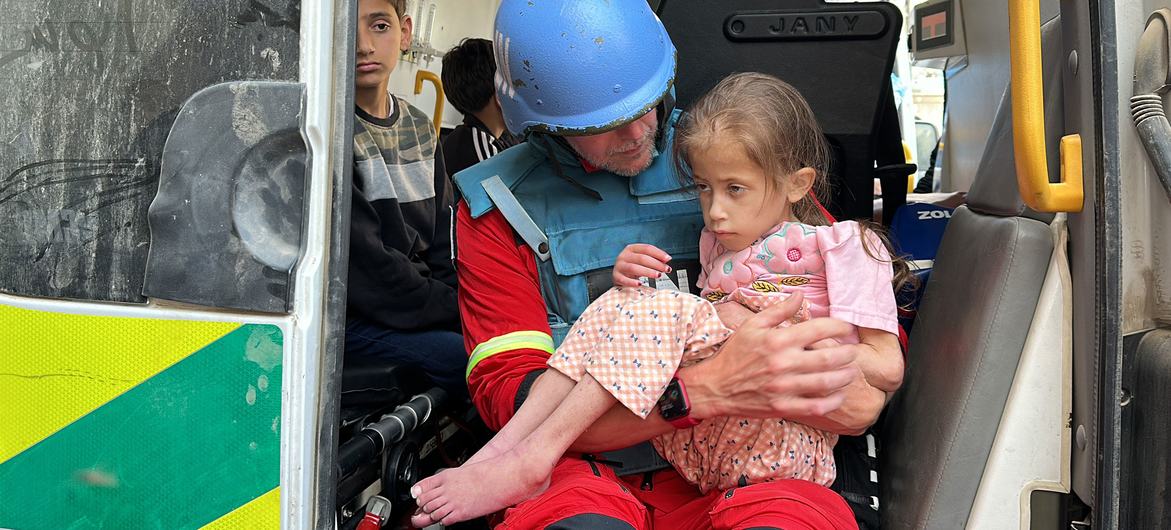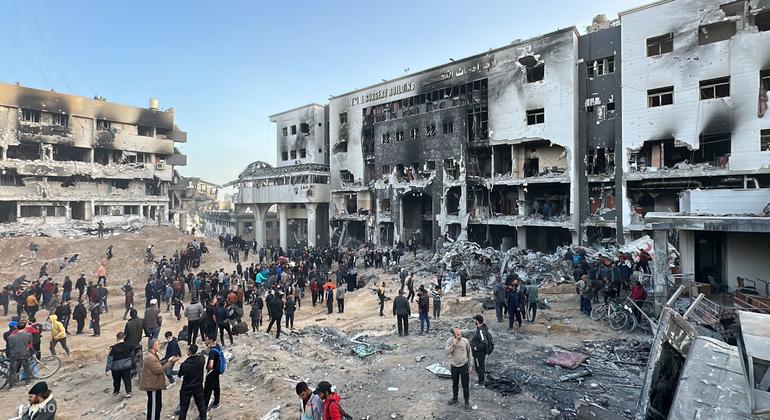The development follows the recovery of hundreds of bodies “buried deep in the ground and covered with waste” over the weekend at Nasser Hospital in Khan Younis, central Gaza, and at Al-Shifa Hospital in Gaza City in the north. A total of 283 bodies were recovered at Nasser Hospital, of which 42 were identified.
“Among the deceased were allegedly older people, women and wounded, while others were found tied with their hands…tied and stripped of their clothes,” said Ravina Shamdasani, spokesperson for the UN High Commissioner for Human Rights.
Al-Shifa discovery
Citing the local health authorities in Gaza, Ms. Shamdasani added that more bodies had been found at Al-Shifa Hospital.
The large health complex was the enclave’s main tertiary facility before war erupted on 7 October. It was the focus of an Israeli military incursion to root out Hamas militants allegedly operation inside which ended at the beginning of this month. After two weeks of intense clashes, UN humanitarians confirmed on 5 April that Al-Shifa was “an empty shell”, with most equipment reduced to ashes.
“Reports suggest that there were 30 Palestinian bodies buried in two graves in the courtyard of Al-Shifa Hospital in Gaza City; one in front of the emergency building and the others in front of the dialysis building,” Ms. Shamdasani told journalists in Geneva.
The bodies of 12 Palestinians have now been identified from these locations at Al-Shifa, the OHCHR spokesperson continued, but identification has not yet been possible for the remaining individuals.
“There are reports that the hands of some of these bodies were also tied,” Ms. Shamdasani said, adding that there could be “many more” victims, “despite the claim by the Israeli Defense Forces to have killed 200 Palestinians during the Al-Shifa medical complex operation”.
200 days of horror
Some 200 days since intense Israeli bombardment began in response to Hamas-led terror attacks in southern Israel, UN human rights chief Volker Türk expressed his horror at the destruction of Nasser and Al-Shifa hospitals and the reported discovery of mass graves.
“The intentional killing of civilians, detainees, and others who are hors de combat is a war crime,” Mr. Türk said, in a call for independent investigations into the deaths.
Mounting toll
As of 22 April, more than 34,000 Palestinians have been killed in Gaza, including 14,685 children and 9,670 women, the High Commissioner’s office said, citing the enclave’s health authorities. Another 77,084 have been injured, and over 7,000 others are assumed to be under the rubble.
“Every 10 minutes a child is killed or wounded. They are protected under the laws of war, and yet they are ones who are disproportionately paying the ultimate price in this war,” said the High Commissioner.
Türk warning
The UN rights chief also reiterated his warning against a full-scale Israeli incursion of Rafah, where an estimated 1.2 million Gazans “have been forcibly cornered”.
“The world’s leaders stand united on the imperative of protecting the civilian population trapped in Rafah,” the High Commissioner said in a statement, which also condemned Israeli strikes against Rafah in recent days that mainly killed women and children.
This included an attack on an apartment building in the Tal Al Sultan area on 19 April which killed nine Palestinians “including six children and two women”, along with a strike on As Shabora Camp in Rafah a day later that reportedly left four dead, including a girl and a pregnant woman.
“The latest images of a premature child taken from the womb of her dying mother, of the adjacent two houses where 15 children and five women were killed – this is beyond warfare,” said Mr. Türk.
The High Commissioner decried the “unspeakable suffering” caused by months of warfare and appealed once again for “the resulting misery and destruction, starvation and disease, and the risk of wider conflict” to end.

A young girl is transferred from the Kamal Adwan hospital, in the far north of Gaza to a hospital in the south of the enclave. (file)
Mr. Türk also reiterated his call for an immediate ceasefire, the release of all remaining hostages taken from Israel and those held in arbitrary detention, and the unfettered flow of humanitarian aid.
Massive settler attacks in West Bank
Turning to the West Bank, the UN rights chief said that grave human rights violations had continued there “unabated”.
This was despite international condemnation of “massive settler attacks” between 12 and 14 April “that had been facilitated by the Israeli Security Forces (ISF)”.
Settler violence has been organized “with the support, protection, and participation of the ISF”, Mr. Türk insisted, before describing a 50-hour long operation into Nur Shams refugee camp and Tulkarem city starting on 18 April.
“The ISF deployed ground troops, bulldozers and drones and sealed the camp. Fourteen Palestinians were killed, three of them children,” the UN rights chief said, noting that 10 ISF members had been injured.
In a statement, Mr. Türk also highlighted reports that several Palestinians had been unlawfully killed in the Nur Shams operation “and that the ISF used unarmed Palestinians to shield their forces from attack and killed others in apparent extrajudicial executions”.
Dozens were reportedly detained and ill-treated while the ISF “inflicted unprecedented and apparently wanton destruction on the camp and its infrastructure”, the High Commissioner alleged.



